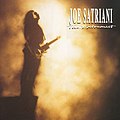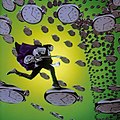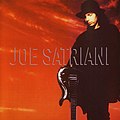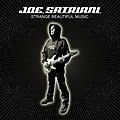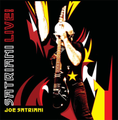Joe Satriani: Difference between revisions
| Line 56: | Line 56: | ||
==Biography and playing history== |
==Biography and playing history== |
||
Joe Satriani was inspired to play guitar at age 14 after hearing that [[Jimi Hendrix]] had died. Satriani reportedly heard the news during a football training session where he immediately confronted his coach and announced that he was quitting to become a guitarist. |
|||
In 1974, he studied music with jazz guitarist [[Billy Bauer]] and with reclusive jazz pianist [[Lennie Tristano]]. The technically demanding Tristano greatly influenced Satriani's playing. Satriani also began teaching guitar, with his most notable student, at this time, being fellow [[Long Island]] native [[Steve Vai]]. |
In 1974, he studied music with jazz guitarist [[Billy Bauer]] and with reclusive jazz pianist [[Lennie Tristano]]. The technically demanding Tristano greatly influenced Satriani's playing. Satriani also began teaching guitar, with his most notable student, at this time, being fellow [[Long Island]] native [[Steve Vai]]. |
||
Revision as of 05:13, 15 January 2007
Joe "Satch" Satriani (born on July 15, 1956, in Westbury, New York, USA) is an American guitarist and guitar teacher. His self- released debut album, Not Of This Earth in 1986 has opened his way to the world of instrumental rock music in a pop-dominated world at that time.[1]
Influenced heavily by 'Jimi Hendrix, Jimmy Page and Jeff Beck,[2] Joe Satriani often incorporating a warm sound of guitar with a dominant blues and rock tone. Since 1990, he began to use his own signature guitar, the Ibanez Joe Satriani series, which is widely sold in stores.[3] Joe Satriani also has had an amplifier signature series, which is the Peavey Joe Satriani Series.
In 1988, Joe Satriani was recruited by Rolling Stones' Mick Jagger as lead guitarist for the very first solo tour. Besides that, Joe Satriani was also asked to be a lead guitarist for Deep Purple in 1994, although later he decided to turn down the proposal.[2] Satriani has also worked with a wide range of guitarists from many styles, including Steve Vai, John Petrucci, Eric Johnson and Robert Fripp through the annual G3 Jam Concerts.[1]
Biography and playing history
Joe Satriani was inspired to play guitar at age 14 after hearing that Jimi Hendrix had died. Satriani reportedly heard the news during a football training session where he immediately confronted his coach and announced that he was quitting to become a guitarist.
In 1974, he studied music with jazz guitarist Billy Bauer and with reclusive jazz pianist Lennie Tristano. The technically demanding Tristano greatly influenced Satriani's playing. Satriani also began teaching guitar, with his most notable student, at this time, being fellow Long Island native Steve Vai.
In 1978 Satriani moved to Berkeley, California to pursue a music career. Not long after his arrival he resumed teaching. His most notable California students included: Kirk Hammett (Metallica), David Bryson (Counting Crows), Kevin Cadogan (Third Eye Blind), Larry LaLonde (Primus), Alex Skolnick (Testament), Phil Kettner (Laaz Rockit) and Charlie Hunter.

When his friend and former student Steve Vai gained fame playing with David Lee Roth in 1986, Vai raved about Satriani in several interviews with guitar magazines. In 1987, Satriani's second album Surfing With the Alien produced popular radio hits, and was the first all-instrumental release to chart so highly in many years. Satriani also toured Australia and New Zealand with Mick Jagger in support of the Rolling Stones singer's solo album.
In 1989, Satriani released the album Flying in a Blue Dream. The album sold well, particularly in Texas. It was heavily promoted by KLBJ-FM in Austin. "One Big Rush" was featured on the soundtrack to the Cameron Crowe movie Say Anything. "The Forgotten Part II" was featured on a Labatt Blue commercial in Canada in 1993. "Big Bad Moon", one of Satch's few singles with personally sung vocals, was a minor hit in late 1989.
In 1992, Satriani released The Extremist, his most critically acclaimed and commercially successful CD to date. Radio stations across the country were quick to pick up on "Summer Song", while "Cryin'", "Friends" and the title track were regional hits. The CD is now considered a rock classic.
In late 1993 Satriani joined Deep Purple as a short-term replacement for departed guitarist Ritchie Blackmore during the band's Japanese tour. The concerts were such a success Satriani was asked to join the band permanently, although his long-term contract with Sony prevented this happening.
In 1996, he formed G3, a concert tour featuring three instrumental rock guitarists -- originally Satriani, Vai, and Eric Johnson. The G3 tour has continued periodically since its inaugural version, where Satriani and Vai are returning members, featured with a floating third member, including Eric Johnson, Yngwie Malmsteen, John Petrucci, Kenny Wayne Shepherd, Robert Fripp, Patrick Rondat and more.
In 1998 Satriani recorded and released Crystal Planet and in 2001 released a Live CD recorded at San Francisco in December 2000 which was also released as a music DVD.
In 2006 Satriani recorded Super Colossal and released another live album, Satriani Live!.
Other work
Satriani is also credited on many other albums, including guitar duties on Alice Cooper's Hey Stoopid (1991), Spinal Tap's Break Like the Wind (1992), Blue Öyster Cult's Imaginos (1988), band members Stu Hamm and Gregg Bissonette's solo albums, and many others including countless guitar heroes-style albums. Interestingly, he was credited for singing background vocals on the 1986 debut album by Crowded House. In 2003, he played lead guitar in The Yardbirds' CD release Birdland. In 2006 he guested on several tracks for Deep Purple's vocalist Ian Gillan's solo CD/DVD dual disc Gillan's Inn.
Technique and influence
Satriani is widely recognized as a technically proficient rock guitarist. He has mastered many performance techniques on the instrument, including two-handed tapping, sweep-picking, volume swells, harmonics, and extreme whammy bar effects. On Big Bad Moon, Satriani uses his harmonica as a slide. One of his trademark compositional traits is the use of Pitch Axis Theory which he applies with a variety of modes. Satriani approaches scales and soloing differently. Instead of practicing his scales in positions he practices his scales one string at a time. He calls this technique ‘linear scales’. He moves into positions on extremely technical passages. Satriani falls into the category of guitar virtuosos who primarily achieve speed through hammer-ons and pull-offs (or Allan Holdsworth), as opposed to guitarists who include lines with very rapid alternate picking of every note in their playing (like Al Di Meola, Yngwie Malmsteen,or Michael Angelo Batio).
Satriani (like Steve Vai, Yngwie Malmsteen and other guitarists who incorporate speed and technical precision in their playing) has been criticized by those who prefer simpler compositional styles. Some of his contemporaries have been known to take pot-shots at the earnest Satriani. For example, Gary Moore once said that he found Satriani's music "cerebral", saying, "it leaves me cold". Although his more flamboyant student, Steve Vai, has garnered more attention, most writers and musicians respect Satriani's musicianship as well as his modest and personable demeanor.
Fans of instrumental electric guitar music widely laud him as the most lyrical and soulful of contemporary rock guitarists, with an eye and an ear for a good tune and, more recently, an emphasis on emotion over technique. Since 1998 his albums have been, stylistically speaking, a departure from his earlier style, delving into simpler, more widely accessible genres. Satriani has maintained a large fan base throughout the world, buoyed largely by the lasting influence of his earlier albums.
His success is notable in a genre typically unfriendly to instrumental musicians. Satriani has received 14 Grammy nominations,[1] and he has sold more than 10 million albums worldwide.[2] Many of his fans call him "Satch," an apocope (shortening) of Satriani, as have his friends over the years. The song "Satch Boogie" from the album Surfing With the Alien is one of possibly several hundred such songs numbered, but with no names ("Satch Boogie 1," "Satch Boogie 143," etc.). Other guitarists sometimes refer to him as "Saint Joe;" there are numerous t-shirts to this effect.
Satriani has endorsed Ibanez's JS Series guitars, and Peavey's JSX amplifier. Both lines were designed specifically as signature products for Satriani.
Gear
Satriani uses a variety of gear. Many of his guitars are made by Ibanez, including the JS100, JS1000, and JS1200. These guitars typically feature the DiMarzio PAF Joe or PAF Pro in the neck pickup position and a DiMarzio Fred or Mo' Joe in the bridge. The JS line of guitars is his signature line, and they feature the Edge Pro, which is Ibanez's exclusive tremolo system. The mirrored silver guitar he used on the Live in San Francisco DVD is called Chrome Boy for obvious reasons.
Satriani has used a wide variety of guitar amps over the years using Marshall amplification in 2001, but has recently settled on taking just two Peavey JSXs on the road--one to perform with and one as a backup. His effects pedals include the Dunlop Cry Baby, Digitech Whammy, BOSS DS-1, Fulltone Ultimate Octave, and Electro-Harmonix POG (Polyphonic Octave Generator), the latter being featured prominently on the title cut to his 2006 Super Colossal.
Satriani has also partnered recently with Planet Waves to create a signature line of guitar picks and guitar straps featuring his sketch art.
Recurring themes
Satriani's work frequently makes references to various science fiction stories and/or ideas. "Surfing With the Alien", "Back to Shalla-Bal" and "The Power Cosmic 2000" are references to the comic book Silver Surfer while "Ice 9" refers to the secret government ice weapon in Kurt Vonnegut's Cat's Cradle. "Borg Sex" is a reference to Star Trek, which features a homogenous race known as the Borg. Additionally, his albums and songs often have other-worldly titles, such as Not of this Earth, Is There Love in Space?, and Engines of Creation.
On the album Super Colossal the song titled "Crowd Chant" was originally called "Party On The Enterprise". "Party On The Enterprise" sampled sounds from the starship Enterprise from the Star Trek TV show. But, as Satriani explained in a podcast,[3] legal issues couldn't get resolved and he wasn't able to get permission to use the samples. Satriani then removed the sounds from the song and called it "Crowd Chant."
"Redshift Riders" another song on the Super Colossal album is "...based on the idea that in the future, when people can travel through out space, they will theoretically take advantage of the cosmological redshift effect so they can be swung around large planetary objects and get across [the] universe a lot faster than normal," Satriani said in a podcast about the song.[4]
Discography
Solo albums
-
The Beautiful Guitar (European compilation album) 1993 -
Additional Creations (Limited Edition Bonus CD with "Engines of Creation") 2000
With other artists
| Year | Artist | Album |
|---|---|---|
| 1989 | Stuart Hamm | Radio Free Albemuth |
| 1997 | Joe Satriani / Steve Vai / Eric Johnson | G3: Live in Concert |
| 2003 | Joe Satriani / Steve Vai / Yngwie Malmsteen | G3: Rockin' in the Free World |
| 2005 | Joe Satriani / Steve Vai / John Petrucci | G3: Live in Tokyo |
| 2006 | Ian Gillan | Gillan's Inn |
Satriani has also composed many songs that are featured in the series of NASCAR based video games including NASCAR 06: Total Team Control.
External links
- Official Website
- 2006 Joe Satriani Interview
- Foreverjoe.com - Satch fan site
- Portuguese Fan Club
- French Fan Club
- SatrianiForum.com - Forum run by and for Joe Satriani fans
- JS10th.com - Joe Satriani Chromeboy guitar register
- Dunlop Official Site
- Myspace: G3
- Myspace: Joe Satriani
- ^ a b John R., Luini. "Joe Satriani Biography". ForeverJoe. Retrieved 2007-1-13.
{{cite web}}: Check date values in:|accessdate=(help); Cite has empty unknown parameter:|coauthors=(help) - ^ a b Shrivastava, Rahul. "Joe Satriani Interview". BBC. Retrieved 2007-1-13.
{{cite web}}: Check date values in:|accessdate=(help); Cite has empty unknown parameter:|coauthors=(help) - ^ Harris, Rich. "Ibanez JS Joe Satriani Guitar Specs". Retrieved 2007-1-13.
{{cite web}}: Check date values in:|accessdate=(help); Cite has empty unknown parameter:|coauthors=(help)




